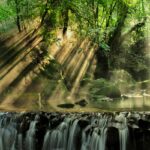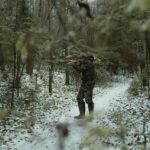Yes, hunting can be a job with potential career options in the hunting industry. The number of people employed in the Hunting & Trapping industry in the US declined -0.6% on average over the five years between 2017 and 2022. There are various job opportunities such as hunting personality/social media influencer, outdoor writer, app designer, outdoor photographer, hunting guide, marketing specialist, and more in the hunting industry.
Check out this Youtube video: “How To Get A Job In The Hunting Industry – YouTube” and discover the exciting potential of turning your passion for hunting into a fulfilling career opportunity.
The Tv Hunter – Being Realistic
Showcasing the realities of a career as a TV hunter
Hunting can indeed be a lucrative and fulfilling career, especially in the modern media landscape. As a TV hunter, you step into the wild, showing the world the challenges and thrills of living off the land.
It’s about connecting with nature, displaying the primal skills harnessed over centuries, and educating audiences on wildlife conservation and sustainable living.
When you showcase the realities of your hunting career, it’s vital to provide a balanced portrayal. This entails highlighting the ethical, legal, and environmental dimensions of hunting.
Your audience expects transparency, authenticity, and accountability. They want to see the genuine challenges and successes, the highs and lows of being a professional hunter.
Moreover, when exploring the challenges and benefits of being a professional hunter in the media, it’s crucial to recognize the impact of social media and celebrity hunters. While social media can greatly expand your reach, creating broader connections and knowledge sharing opportunities, it also poses the risk of misrepresenting the essence of hunting.
It’s important to navigate these challenges responsibly by respecting the wildlife and projecting a positive, ethical image.
Furthermore, hunting TV shows play a significant role in fostering a community of like-minded individuals. They unite viewers in their love for the great outdoors, animal encounters, and ecological preservation.
Nonetheless, as a TV hunter, you must be prepared to handle the ongoing controversy surrounding hunting activities. Engaging in meaningful dialogues to address concerns and showcasing the ethical and lawful dimensions of hunting is crucial to dispelling misconceptions.
As a professional hunter in the media, your journey comes with both merits and hardships. It’s about upholding authenticity, demonstrating stewardship towards nature, and providing an unvarnished view that captivates and informs your audience.
| Challenges | Benefits |
|---|---|
| Misrepresentation | Broadened Reach |
| Ethical Controversy | Community Engagement |
| Legal Scrutiny | Educational Impact |
Getting Started In The Outdoor Industry
Can hunting be a job?
Becoming a professional hunter and earning a living through hunting is a dream for many. While it’s a challenging journey, it’s certainly possible to turn your passion for hunting into a rewarding career.
Let’s explore the steps and skills required to enter the outdoor industry as a professional hunter.
Steps to entering the outdoor industry as a professional hunter
- Acquire Hunting Education: The first step to becoming a professional hunter is to acquire a comprehensive understanding of hunting techniques, safety measures, and local hunting regulations. This can be achieved through formal education, mentorship programs, or wilderness training courses.
- Obtain Licensure: Professional hunters are required to obtain licensure in all states. This process involves completing a hunter safety course and familiarizing oneself with the legalities of hunting. The U. S. Fish and Wildlife Service provides valuable resources for aspiring professional hunters.
- Develop Specialized Skills: To stand out in the competitive hunting industry, aspiring professionals should develop specialized skills such as wildlife tracking, understanding animal behavior, and proficiency in the use of hunting tools like firearms, archery, traps, snares, and alternative techniques like spear and rocks hunting.
- Networking: Building a strong network within the hunting community is essential. Attending hunting events, joining clubs and associations, and connecting with experienced professionals can provide valuable opportunities and mentorship.
- Gain Industry Experience: Working in the outdoor industry, especially through retail roles, can provide valuable experience and insights into the dynamics of the hunting industry.
Necessary skills and qualifications for aspiring hunters
Becoming a successful professional hunter requires a diverse skill set combined with a deep understanding of ethical hunting practices and wildlife conservation. Some key skills and qualifications include:
- Knowledge of Local Hunting Regulations: Understanding and complying with local hunting laws and regulations is fundamental for professional hunters to ensure ethical and legal hunting practices.
- Safety and Ethics: Prioritizing safety and ethical hunting practices is essential for maintaining a positive reputation and ensuring the sustainability of the hunting industry.
- Wildlife Conservation: As an aspiring professional hunter, having a deep regard for wildlife conservation and promoting sustainable hunting practices is crucial for the long-term health of the industry.
- Physical Fitness: Hunting often involves strenuous activities, so maintaining good physical condition is important for professional hunters to endure long expeditions and challenging terrains.
- Expertise in Hunting Techniques: Developing proficiency in various hunting techniques, including firearm handling, archery, tracking, and camouflage, is critical for success in the hunting industry.
- Communication Skills: Professional hunters should possess strong communication skills to collaborate with peers, interact with clients, and advocate for ethical hunting practices.
- Adaptability: Given the unpredictable nature of hunting, adaptability is a crucial skill for professional hunters to thrive in different environments and situations.
- Marksmanship: Mastery in marksmanship is a fundamental skill for hunters, requiring precision, accuracy, and an understanding of ballistics.
To summarize, aspiring hunters must undergo comprehensive training, obtain licensure, develop specialized skills, and embrace the ethical and sustainable aspects of hunting to successfully enter the outdoor industry as professional hunters.
For a comprehensive breakdown of the skills required for professional hunting, refer to the following table:
| Skill | Description |
|---|---|
| Hunting Techniques | Proficiency in various hunting methods including firearm handling, archery, trapping, and tracking. |
| Legal Knowledge | Understanding and compliance with local hunting regulations and laws. |
| Wildlife Conservation | Commitment to ethical hunting practices and the conservation of wildlife and habitats. |
| Physical Fitness | Maintenance of good physical condition to endure the demands of hunting in diverse terrains. |
| Communication Skills | Effective communication to collaborate with peers, interact with clients, and promote ethical hunting practices. |
| Marksmanship | Mastery in marksmanship, including precision, accuracy, and understanding of ballistics. |
| Ethics and Safety | Adherence to ethical hunting practices and prioritization of safety for oneself and others during hunting expeditions. |
| Adaptability | Ability to adapt to varied hunting environments and situations, demonstrating resourcefulness and resilience. |
By equipping themselves with these skills and qualifications, aspiring hunters can embark on a fulfilling journey in the professional hunting industry.
Six Job Examples In The Outdoor Industry
In the outdoor industry, there are various job roles that pertain to hunting, offering specific career paths and opportunities for hunters to pursue. Whether it’s providing gear, food, shelter, and guide services to sportsmen hunting in unfamiliar territory or taking on the role of an outdoor writer, the hunting industry offers a diverse range of career options.
Let’s take a look at six job examples in the outdoor industry that specifically relate to hunting.
Outlining various job roles in the outdoor industry pertaining to hunting
The outdoor industry offers a wide array of job roles targeted towards hunters. These include outfitter, gunsmith, hunting guide, store manager, outdoor writer, fisherman, communications manager, wildlife biologist, hunting personality/social media influencer, app designer, outdoor photographer, marketing specialist, sporting goods sales representative, and wildlife officer, among others.
Each of these roles requires a unique set of skills and experiences, catering to individuals with diverse interests and expertise.
Highlighting specific career paths and opportunities for hunters
- Outfitter: This role involves providing gear, food, shelter, and guide services to sportsmen hunting in unfamiliar territory. It requires lifelong hunting experience and knowledge of outdoor survival skills.
- Hunting Guide: As a hunting guide, individuals can lead hunting expeditions, provide expertise on hunting grounds, and ensure the safety and success of hunting trips for clients. It demands a deep understanding of various hunting techniques and wildlife behavior.
- Outdoor Writer: Outdoor writers have the opportunity to share their passion for hunting through engaging, informative content. They can contribute articles to hunting magazines, blogs, and outdoor publications, leveraging their hunting experiences to educate and inspire others.
- Wildlife Biologist: This profession focuses on studying and managing animal populations in their natural habitats. Wildlife biologists play a crucial role in conservation efforts and ensuring sustainable hunting practices.
- Hunting Personality/Social Media Influencer: With the rise of social media, individuals can build a career as hunting personalities or influencers, sharing their hunting adventures, gear reviews, and hunting tips with a broad audience.
- Outdoor Photographer: Hunters with a keen eye for photography can capture stunning images of wildlife, nature, and hunting experiences, contributing to publications, online platforms, and advertising campaigns.
By exploring these specific career paths and opportunities, hunters can find fulfilling and diverse roles within the outdoor industry, aligning with their passion for hunting and the great outdoors.
| Job Title | Description |
|---|---|
| Outfitter | Provides gear, food, shelter, and guide services to sportsmen hunting in unfamiliar territory. |
| Hunting Guide | Leads hunting expeditions, provides expertise on hunting grounds, and ensures the safety and success of trips. |
| Outdoor Writer | Contributes engaging and informative hunting-related content to various publications. |
| Wildlife Biologist | Studies and manages animal populations in their natural habitats, contributing to conservation efforts. |
| Hunting Personality/Social Media Influencer | Builds a presence on social media, sharing hunting adventures, tips, and gear reviews. |
| Outdoor Photographer | Captures stunning images of wildlife, nature, and hunting experiences, contributing to various platforms. |
Career Paths for Hunters
Understanding the different paths available to individuals pursuing a career in hunting
For individuals passionate about hunting, there are various career paths to explore, allowing them to pursue their passion while making a living. One such path involves becoming a hunting guide, leading individuals or groups on hunting expeditions and sharing their knowledge of hunting techniques and wildlife behavior.
Hunting guides often work for outdoor adventure companies, hunting lodges, or as freelance guides, providing them with flexibility in their work schedule and the opportunity to explore different hunting landscapes.
Another career path within the hunting industry is that of a wildlife biologist, where professionals study animal behaviors, populations, and habitats to support wildlife conservation efforts. These individuals work with government agencies, environmental organizations, or research institutions to conduct fieldwork and research, contributing to the sustainable management of hunting grounds and wildlife populations.
With a focus on environmental protection and wildlife management, this career path offers a deep connection to the natural world and the opportunity to make a meaningful impact on conservation efforts.
Furthermore, individuals can pursue a career as an outfitter, specializing in providing hunting equipment, gear, and supplies to hunters. Whether operating a physical store or an online retail platform, outfitters play a crucial role in supporting hunters with the necessary tools for their expeditions, including firearms, camouflage clothing, and hunting accessories.
Additionally, outfitters may offer services such as equipment maintenance, hunting trip planning, and firearm customization, catering to the needs of hunting enthusiasts.
Among the diverse paths available, a career as an outdoor writer offers individuals the opportunity to combine their love for hunting with their writing skills. Outdoor writers contribute to hunting magazines, blogs, and publications, sharing hunting tips, narratives of hunting experiences, and insights into outdoor activities.
Their ability to articulate the thrill of the hunt, discuss hunting techniques, and offer advice on navigating the wilderness makes them valuable contributors to the hunting community, inspiring and educating fellow hunters through their written work.
The hunting industry presents a range of career paths, catering to individuals with varied interests and expertise. Whether guiding hunting expeditions, supporting conservation efforts, providing essential gear, or sharing hunting experiences through writing, there are numerous opportunities for individuals to pursue rewarding careers within the hunting industry.
| Career Path | Description |
|---|---|
| Hunting Guide | Lead hunting expeditions, share hunting knowledge, work for outdoor adventure companies or as freelance guides. |
| Wildlife Biologist | Study animal behaviors, populations, and habitats, work with government agencies, environmental organizations, or research institutions. |
| Outfitter | Provide hunting equipment, gear, and supplies to hunters, operate physical stores or online retail platforms. |
| Outdoor Writer | Contribute to hunting magazines, blogs, and publications, share hunting tips, narratives of hunting experiences, and insights into outdoor activities. |
Exploring the diverse opportunities within the hunting industry
In addition to traditional hunting careers, the industry has embraced digital advancements, creating new opportunities for individuals to engage with hunting on various platforms. One such opportunity lies in the role of a social media influencer within the hunting community.
By leveraging social media platforms, individuals can showcase their hunting experiences, provide product reviews, and build a loyal following of fellow hunters. Social media influencers often collaborate with hunting brands, creating sponsored content and promoting hunting-related products, thereby monetizing their passion for hunting.
Furthermore, the digital landscape has opened doors for careers in digital marketing and search engine optimization (SEO) within the hunting industry. Professionals in these roles focus on enhancing the online visibility of hunting businesses, optimizing websites for relevant keywords, and implementing digital strategies to reach and engage the hunting community.
With the increasing emphasis on e-commerce and online presence, digital marketing specialists and SEO experts play pivotal roles in shaping the digital footprint of hunting-related businesses.
An emerging career path within the hunting industry is that of a communications manager, responsible for developing and executing communication strategies for hunting organizations, conservation groups, or outdoor brands. This role involves overseeing public relations, content creation, and brand messaging, allowing individuals to contribute to the storytelling and promotion of hunting experiences, conservation efforts, and outdoor lifestyle.
Another avenue for career growth within the hunting industry is through the role of a fisherman, exploring the world of angling and pursuing careers related to fishing expeditions, tackle manufacturing, or fishery management. While fishing and hunting are distinct activities, the overlap between the two industries creates opportunities for individuals to diversify their expertise and explore various outdoor pursuits.
The hunting industry offers a diverse range of career opportunities, from traditional roles such as hunting guides and outfitters to modern, digitally-driven positions like social media influencers, digital marketing specialists, and communications managers. With a blend of tradition and innovation, individuals passionate about hunting can find fulfilling careers that align with their interests and skills, contributing to the vibrant and dynamic landscape of the hunting industry.
| Career Opportunity | Description |
|---|---|
| Social Media Influencer | Showcase hunting experiences, provide product reviews, build a loyal following, collaborate with hunting brands, and create sponsored content. |
| Digital Marketing Specialist | Enhance online visibility, optimize websites for relevant keywords, and implement digital strategies to reach and engage the hunting community. |
| SEO Specialist | Focus on optimizing websites for search engines, improving online visibility, and driving organic traffic to hunting-related businesses. |
| Communications Manager | Develop and execute communication strategies for hunting organizations, conservation groups, or outdoor brands, overseeing public relations and brand messaging. |
| Fisherman | Explore opportunities in angling, tackle manufacturing, or fishery management, diversifying expertise and engaging in outdoor pursuits. |
Wildlife Biologist
Exploring the role of a wildlife biologist in the context of hunting as a career
Hunting plays a significant role in the responsibilities of a wildlife biologist, as they are tasked with ensuring sustainable and ethical hunting practices. Wildlife biologists are at the forefront of managing and maintaining wildlife populations, including those targeted for hunting.
They conduct in-depth studies to understand the impact of hunting on animal populations and ecosystems, utilizing this knowledge to establish hunting regulations and guidelines. By actively engaging in conservation efforts and wildlife management, they strive to strike a balance between preserving natural habitats and allowing controlled hunting activities.
In their role, wildlife biologists also collaborate with regulatory bodies and stakeholders to enforce hunting ordinances that safeguard the well-being of wildlife species. They may undertake population surveys to assess the impact of hunting on specific animal populations, providing critical data to regulatory authorities.
Additionally, wildlife biologists inform and educate the public about sustainable hunting practices and contribute to the formulation of conservation strategies that align with hunting initiatives.
Educational requirements and job responsibilities for aspiring wildlife biologists in the hunting industry
Aspiring wildlife biologists seeking a career in the hunting industry typically embark on a robust educational journey. To pursue this career path, individuals should acquire a relevant bachelor’s degree, such as zoology, wildlife biology, or natural resources.
These programs equip students with a strong foundation in biology and specialized knowledge in wildlife management, ensuring they are well-equipped to address the unique challenges present in the hunting industry.
Furthermore, obtaining a master’s degree in wildlife biology or a related field is increasingly beneficial, as it enhances job prospects and provides a deeper understanding of ecological principles and conservation strategies relevant to hunting. Job responsibilities for wildlife biologists in the hunting industry encompass a wide range of tasks, including population monitoring, habitat conservation, and the formulation of hunting regulations based on scientific research and ecological data.
Wildlife biologists are pivotal in upholding the delicate balance between hunting and wildlife conservation, contributing to the sustainable coexistence of hunting activities and the preservation of diverse wildlife populations.
Influencer
Social media and digital platforms play a pivotal role in shaping the hunting industry’s narrative and impacting its evolution. The influence of social media and digital platforms in the hunting industry continues to expand, providing hunters with unprecedented opportunities for knowledge-sharing, product reviews, and community engagement.
Moreover, these platforms have led to the amplification of the hunting culture, allowing enthusiasts to showcase their experiences, skills, and gear, thus influencing a wider audience.
Analyzing the influence of social media and digital platforms in the hunting industry
As the digital landscape evolves, the hunting industry has experienced a significant transformation through the power of social media and digital platforms. Hunting enthusiasts and professionals have leveraged these mediums to share their experiences, expertise, and products, thereby expanding the industry’s reach and engagement.
Platforms such as Instagram, YouTube, and hunting-specific websites have facilitated the creation of hunting-related content, driving conversations, and providing informative resources to both seasoned hunters and those new to the pursuit. Additionally, these platforms have enabled wildlife conservation and ethical hunting practices to be widely promoted and understood.
Exploring the potential for hunting influencers as a career path
The burgeoning potential for hunting influencers as a viable career path exemplifies the dynamic nature of the hunting industry. Individuals who establish themselves as hunting influencers can tap into a range of opportunities, including sponsored content, brand partnerships, and participation in industry events.
By building a strong personal brand and cultivating a dedicated following, hunting influencers can significantly influence purchasing decisions and trends within the hunting community. Through their authentic representation of hunting experiences and endorsement of products, influencers wield substantial persuasive power, making their role an essential component of the industry’s marketing ecosystem.
| Age Range | Gender | Location | Vertical | Personality | Average Audience Size |
|---|---|---|---|---|---|
| 25-45 | Male | Rural | Hunting & Outdoors | Outspoken, Authentic, Outdoorsy | 50,000-100,000 |
The roadmap for aspiring hunting influencers involves the establishment of a robust online presence through various platforms, quality content creation that resonates with the target audience, and strategic partnerships with brands aligning with their values. By establishing a distinctive personal brand and consistently delivering engaging and informative content, aspiring influencers can carve out a rewarding career in the hunting industry.
Social media and digital platforms have redefined the landscape of the hunting industry, providing substantial opportunities for hunting enthusiasts to leverage their passion and expertise. The potential for hunting influencers as a career path underscores the industry’s dynamic nature and the significant role of personal branding and digital influence in shaping its future trajectory.
Wildlife Conservationist
Conceptualizing the role of a wildlife conservationist within the hunting industry
As a wildlife conservationist operating within the hunting industry, it is imperative to comprehend the intricate relationship between hunting and conservation efforts. Understanding the positive impact that responsible and sustainable hunting practices can have on wildlife populations is essential.
This entails recognizing that regulated hunting aids in managing the population of certain species, preventing overpopulation, and controlling ecological imbalances. By conceptualizing the role of a wildlife conservationist in this context, it becomes evident that working alongside hunters to promote ethical and sustainable hunting practices can contribute significantly to wildlife preservation.
Such collaboration involves fostering awareness about the necessity of conservation and advocating for responsible hunting techniques. This entails educating hunters about the importance of adhering to wildlife management regulations, promoting species-specific conservation initiatives, and providing resources to facilitate ethical hunting practices.
Additionally, engaging with wildlife enthusiasts, including hunters, to emphasize the need for wildlife conservation and the integration of sustainable hunting as a tool for species management is crucial.
Exploring the intersection of conservation efforts and hunting as a potential career
The intersection of conservation efforts and hunting presents a unique opportunity for individuals to pursue a career in wildlife management and preservation. For instance, individuals can explore careers as wildlife biologists, wildlife officers, or conservation educators specializing in sustainable hunting practices.
These careers involve engaging in research, implementing wildlife management strategies, and educating the public about the role of hunters in conservation efforts. Moreover, individuals can consider roles in environmental policy development, wildlife law enforcement, and wildlife habitat restoration to support the integration of conservation and hunting as a potential career.
Furthermore, individuals with a passion for wildlife conservation can pursue opportunities in wildlife tourism management, guiding hunting expeditions that prioritize ethical and sustainable practices, and promoting wildlife education within the hunting community. By exploring the professional landscape that encompasses both conservation efforts and hunting, individuals can make valuable contributions to the preservation of wildlife while embracing the sustainable utilization of hunting as a means to achieve conservation goals.
| Wildlife Conservation Careers |
|---|
| 1. Wildlife Biologist |
| 2. Conservation Educator |
| 3. Wildlife Officer |
| 4. Environmental Policy Specialist |
| 5. Wildlife Tourism Manager |
| 6. Habitat Restoration Specialist |
| 7. Wildlife Law Enforcement Officer |
| 8. Hunting Expedition Guide |
| 9. Wildlife Conservationist |
Game Warden/Conservation Officer
Game wardens and conservation officers play a vital role in managing wildlife and preserving natural habitats, especially in the context of hunting. Their responsibilities often revolve around enforcing hunting, fishing, and boating regulations, and safeguarding natural resources for future generations.
These professionals are entrusted with the task of patrolling specified areas, often utilizing various modes of transportation like car, boat, or horse, in order to ensure compliance with relevant laws.
Examining the responsibilities and duties of game wardens and conservation officers in relation to hunting
In relation to hunting, game wardens and conservation officers are responsible for issuing hunting permits, ensuring their validity, and monitoring hunting activities to prevent illegal practices such as poaching or exceeding bag limits. They also oversee wildlife education programs, engaging with the public to impart knowledge about conservation efforts and ethical hunting practices.
Moreover, they collaborate with law enforcement agencies to investigate and prosecute individuals involved in wildlife-related crimes, thereby contributing to the preservation of natural ecosystems.
Understanding the potential career paths within law enforcement and conservation as it pertains to hunting
Individuals pursuing a career as a game warden or conservation officer can embark on diverse career paths within law enforcement and conservation. With the requisite experience and expertise, they may progress to supervisory or administrative positions within state or federal agencies.
Moreover, the role of a field training officer or wildlife officer may also be attained through significant dedication and service in the field. Pursuing a degree in fields such as criminal justice or environmental sciences can further pave the way for a rewarding career as a game warden or conservation officer.
| Responsibilities of Game Wardens and Conservation Officers | Career Paths within Law Enforcement and Conservation |
|---|---|
| Issuing hunting, fishing, and boating permits | Advancement to supervisory or administrative positions |
| Leading wildlife education programs | Promotion to field training officer or wildlife officer |
| Enforcing hunting regulations | Career progression through dedicated service and experience |
Average Hunter Salary
In a season’s harvest, the average salary of a professional hunter can vary significantly based on a multitude of factors, making it difficult to pinpoint an exact figure. The type of animals being hunted plays a vital role in determining the earning potential of a professional hunter, with some game more lucrative than others.
For instance, guided big-game hunts often command higher fees, leading to a more substantial income for the hunter.
Analyzing the average salary of professional hunters
A comprehensive analysis of the average salary of professional hunters reveals a wide spectrum in potential earnings. According to Hunter International (December 2023), a professional hunter in the United States can earn anywhere between $2,400 (3.4%) to $89,560 (127.1%) more than the average Hunter International salary of $70,439. The substantial variance in potential income is reflective of the diverse nature of this profession, where specialization and expertise play a defining role in shaping one’s pay scale.
Moreover, the occupation of fishing and hunting workers offers a glimpse into the financial landscape of this career. While the Pay tab details the typical earnings and employment factors in this line of work, it is evident that the financial returns can vary widely based on factors such as experience, skill, and targeted game.
This underscores the significance of honing one’s expertise to potentially command higher compensation in the field.
Exploring the financial aspects of pursuing a career in hunting
Delving deeper into the financial aspects of pursuing a career in hunting, it is notable that the average professional hunter salary in the United States stands at $35.02 per hour or $72,839 annually. This figure underscores the financial viability of embracing hunting as a career path.
The earning potential is shaped not only by the market demand for specific game but also by the favorable employment outlook within the industry.
The aspect of hunting contributing to the broader economic landscape is evident. Hunter spending plays a pivotal role in supporting wildlife and natural resource management, alleviating the financial burden of conservation work, and bolstering employment opportunities.
This illustrates how hunting transcends being merely a livelihood, emerging as a crucial contributor to broader conservation and ecological objectives.
Conclusively, the average salary of professional hunters is contingent on various factors, including the targeted game, expertise, and market demand. The financial viability of pursuing a career in this field is substantial, backed by diverse earning opportunities and a positive employment outlook in the industry.
Hunter Skills and Job Requirements
Essential Skills for Hunting Careers
Hunting requires a unique set of skills that are indispensable for success. Expert knowledge of firearms and ammunition, proficiency in tracking and field dressing, and the ability to navigate through challenging terrains are foundational requirements. Additionally, mastering the technique of calling and decoying game animals proves invaluable for a successful hunt. Moreover, possessing first aid expertise, adeptness in survival skills, and knowledge of wildlife management are key for a thriving hunting career.
Qualifications and Job Responsibilities
Within the hunting industry, various roles demand specific qualifications and responsibilities. As an outfitter, one must possess strong leadership skills, business acumen, and customer service proficiency. Similarly, becoming a hunting guide requires extensive knowledge of hunting grounds, exceptional communication skills, and the ability to ensure the safety of clients while delivering an exciting experience. For a wildlife biologist, a bachelor’s degree in biology or a related field is essential, along with field research experience and understanding of conservation practices.
Education and Advancement Opportunities
Embarking on a hunting career often necessitates specific education to advance in the field. Completing a hunter education course is mandatory for individuals over the age of 14 pursuing hunting large game animals.
Moreover, acquiring a degree in wildlife management, environmental science, or a related field opens doors to diverse job opportunities, such as becoming a game warden or wildlife conservation officer. Constant learning and certification in firearm safety, wilderness first aid, and wildlife law enforcement further solidify one’s position within the hunting industry.
Overview of Educational Attainment
The hunting industry reveals intriguing educational trends among its professionals. Around 55.2% of hunters hold a bachelor’s degree, highlighting the emphasis on academic qualifications within the field.
Moreover, 3.3% of hunters have pursued master’s degrees, showcasing a minority of professionals seeking advanced education to bolster their expertise and career prospects.
Job Prospects and Salaries
Embracing a career in hunting promises a plethora of job opportunities with varying salary ranges. As an outfitter, individuals can expect to earn substantial income, often exceeding $60,000 annually, while a hunting guide may earn between $25,000 to $50,000, depending on experience and location. Pursuing roles as a wildlife biologist can result in a median salary range of $63,000 to $76,000, offering competitive compensation within the conservation sector.
Future Pathways in Hunting
The hunting industry continually evolves, presenting future professionals with extensive growth prospects. Opportunities for specialization in wildlife research, conservation management, and outdoor journalism signify a dynamic field with diverse avenues for career advancement.
Embracing technological advancements, such as drone utilization for wildlife monitoring and GIS mapping for habitat analysis, aligns with the modernization of hunting practices, creating a compelling landscape for prospective individuals.
Advantages of Pursuing a Career in Hunting
Considered an integral part of the outdoor and conservation industries, hunting careers provide unrivaled connections to nature, wildlife, and environmental preservation efforts. Enthusiasts relish the prospect of blending their passion for the outdoors with fulfilling professional endeavors, contributing to sustainable ecological practices while engaging in exhilarating and meaningful work experiences.
The gratification derived from upholding conservation ethics, promoting responsible hunting practices, and safeguarding wildlife habitats enriches the overall appeal of pursuing a career in hunting.
Qualifications and Salaries in the Hunting Industry
| Role | Qualifications | Median Salary Range |
|---|---|---|
| Outfitter | Leadership skills, business acumen, customer service proficiency | Exceeds $60,000 annually |
| Hunting Guide | Extensive hunting knowledge, exceptional communication, prioritizing safety | $25,000 to $50,000 annually |
| Wildlife Biologist | Bachelor’s degree in biology or related field, research experience | $63,000 to $76,000 annually |
| Game Warden | Degree in wildlife management or environmental science, law enforcement certification | Varies based on location and experience |
Recommended Amazon Products for Pursuing a Career in Hunting
Here’s a curated list of products that can help you pursue a career in hunting with ease. These recommendations are based on functionality, popularity, and reviews.
Wildgame Innovations Terra Extreme Trail Camera
The Wildgame Innovations Terra Extreme Trail Camera allows you to monitor wildlife activity, helping you gather valuable data for hunting and conservation efforts. With its durable construction and easy setup, this trail camera is a popular choice among hunters and wildlife enthusiasts.
Plus, it has received high ratings and positive reviews from users.
Bushnell Trophy Red Dot Sight Riflescope
The Bushnell Trophy Red Dot Sight Riflescope is designed for quick target acquisition, making it ideal for hunting and shooting sports. Its high-quality optics and rugged construction make it a reliable choice for hunters of all skill levels.
Users have praised its precision and durability, making it a popular option for hunting enthusiasts.
Primos Trigger Stick Gen 3 Series
The Primos Trigger Stick Gen 3 Series offers adjustable height and stability for steady shooting, whether you’re hunting big game or capturing wildlife footage. Its lightweight yet sturdy design makes it easy to carry during long hunting trips, and its versatility has earned it positive feedback from users.
Top Recommended Product for Pursuing a Career in Hunting
If you’re looking for the best solution for pursuing a career in hunting, we highly recommend the Wildgame Innovations Terra Extreme Trail Camera. Here’s why:
It provides reliable wildlife monitoring and data collection, essential for hunting and conservation efforts. The camera has received positive reviews for its performance and durability, making it a popular choice among hunters and wildlife enthusiasts. Ready to kickstart your hunting career? Check out the Wildgame Innovations Terra Extreme Trail Camera today for the best results!
Pros and Cons Comparison Table
| Product | Pros | Cons |
|---|---|---|
| Wildgame Innovations Terra Extreme Trail Camera | Durable construction, Easy to set up, Positive user reviews | Requires additional accessories |
| Bushnell Trophy Red Dot Sight Riflescope | Quick target acquisition, High-quality optics, Rugged construction | Some users may prefer traditional scopes |
| Primos Trigger Stick Gen 3 Series | Adjustable height, Lightweight yet sturdy, Versatile | May not be suitable for all hunting environments |
Frequently Asked Questions
Is hunting considered a job?
Why is job hunting so haunting?
Is hunting still a profession?
What is hunting considered?
Can you make a living off hunting?
Reference Links
- https://www.ncbi.nlm.nih.gov/pmc/articles/PMC7222849/
- https://wildlife.ca.gov/Enforcement/Career/Qualifications
- https://www.indeed.com/q-hunting-industry-jobs.html
- https://tpwd.texas.gov/warden/recruiting-careers/requirements
- https://www.iucn.org/news/world-commission-environmental-law/201909/compatibility-trophy-hunting-a-form-sustainable-use-iucns-objectives







